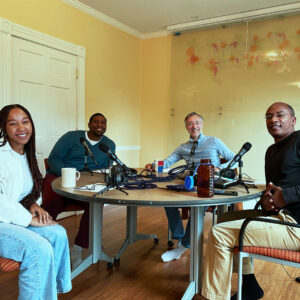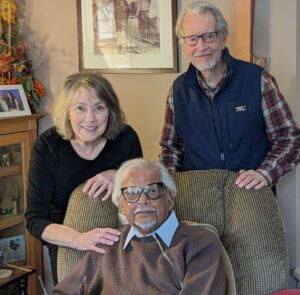In a recent post on The Daily Beast, Arthur Chu of Jeopardy! fame wrote a brave, incisive and even confessing analysis of the role that bright, socially awkward men play in sexual violence against women.
These nerds, as Chu calls them (and self-identifies), are driven by a compelling and ubiquitous cultural dialogue about how attractive, socially capable women will always fall madly in love with the nerdy underdog:
We (male) nerds grow up force-fed this script. Lusting after women “out of our league” was what we did. And those unattainable hot girls would always inevitably reject us because they didn’t understand our intellectual interest in science fiction and comic books and would instead date asshole jocks. This was inevitable, and our only hope was to be unyieldingly persistent until we “earned” a chance with these women by “being there” for them until they saw the error of their ways.
Chu continues with a critique of this view, pointing out the challenge that young men will discover if they adopt this paradigm of women and relationships for their own lives:
We are not the lovable nerdy protagonist who’s lovable because he’s the protagonist. We’re not guaranteed to get laid by the hot chick of our dreams as long as we work hard enough at it. There isn’t a team of writers or a studio audience pulling for us to triumph by “getting the girl” in the end. And when our clever ruses and schemes to “get girls” fail, it’s not because the girls are too stupid or too bitchy or too shallow to play by those unwritten rules we’ve absorbed.
It’s because other people’s bodies and other people’s love are not something that can be taken nor even something that can be earned—they can be given freely, by choice, or not.
As a recovering nerd in my own life – as someone who has had to work to develop not only social skills but empathy with women – Chu’s arrow lands straight on the bullseye. Yet, as a student of Nonviolent Communication, I’m also concerned that Chu calls upon angry young men to “grow up” – to engage in an honest process of honoring women as free beings – without making any specific requests. In the hope that some angry and confused men may be reading this, I wish to make some of these requests. I base them upon Chu’s observations about relationship lies within our culture – stories that I also failed to impose upon reality.
To my fellow nerds:
Would you be willing to stop watching television and movies that reinforce dishonest views about the behavior and appearance of women?
Are you angry because you can’t find a girl who will turn her life over to you, even though you’ve made the right moves and done the right things? As Chu points out, there are no right moves. There is no way to make someone love or desire you, but countless television and movie plotlines hinge upon that notion. As I’ve had to learn and am still learning, some people like you and some people don’t. That’s normal and okay.
I’d also extend Chu’s criticism to any film or series that portrays relationships and women in ways that don’t quite seem to match the real world. This is one of the reasons I’ve stopped watching Game of Thrones, HBO’s smash hit series (based upon George R.R. Martin’s epic A Song of Fire and Ice novels). GoT’s penchant for graphic violence is well-known, but I also find the series’ reliance on stunningly attractive female actors (including former porn stars) questionable. Most women I know don’t look or act like the women in Game of Thrones. It doesn’t look like the world, so I find it dishonest.
Would you be willing to stop consuming pornography?
If you’re feeling frustrated because you can’t sexually express yourself as you’d prefer, you may wish to consider from where your preferences have originated. If you’re a young man, the odds are stellar that pornography has shaped your views of sex – a 2008 study in the Journal of Adolescent Research showed that 87% of young men had consumed pornography (https://www.ncjrs.gov/App/publications/abstract.aspx?ID=242865).
For nerds, abstaining from porn should be a no-brainer – it’s so laughably fake. But those who fall into frequent use expose themselves over and over again to stories about women involving raunchy, violent, instant sex. If you fall into this category, would you be willing to explore how your expectations of sex – how much, at what age, how often and with how many – may differ from what women actually want?
Would you be willing to stop listening to love and lust songs that portray women as doting or obedient?
While many nerds might express disdain for popular music (since it’s popular), there are many who quietly listen to it (since it’s popular). Are you feeling lonely because women don’t long for you in the way is promised in popular songs? Just consider some popular lyrics from last year, by men and women:
- You give me that kind of something / Want it all the time, need it everyday / On a scale of one to ten I’m at a hundred / Never get enough, I can’t stay away (The Way by Ariana Grande)
- I know you want it / But you’re a good girl / The way you grab me / Must wanna get nasty / Go ahead, get at me (Blurred Lines by Robin Thicke)
- ‘Cause I don’t wanna lose you now / I’m lookin’ right at the other half of me / The vacancy that sat in my heart / Is a space that now you hold (Mirrors by Justin Timberlake)
- ‘Cause you are the piece of me I wish I didn’t need / Chasing relentlessly, still fight and I don’t know why / If our love is tragedy, why are you my remedy? / If our love’s insanity, why are you my clarity? (Clarity by Zedd)
- You ain’t gotta worry, it’s an open invitation / I’ll be sittin’ right here, real patient / All day, all night, I’ll be waitin’ standby / Can’t stop because I love it, hate the way I love you / All day, all night, maybe I’m addicted for life, no lie. (Come & Get It by Selena Gomez)
These are powerful and questionable messages about intimacy and desire between men and women. If you find yourself frustrated because you can’t achieve them, would you be willing to stop listening to these messages?
Would you be willing to stop participating in games or reading comics that objectify (literally) women?
Do I even need to mention Grand Theft Auto here? When I played video games in my early 20s, GTA was my preferred poison – but it’s hardly the worst or the only game to portray women comically. Both comics and video games tend to use women as plot elements – as objectives that the hero must achieve or even conquer – or as fringe benefits to defeating a villain. If you’re feeling frustrated because you aren’t connecting with women in the ways your heroes are, would you be willing to find new heroes? As Chu states, women – just like men – give away their love. It isn’t earned. You don’t level up, you don’t get new achievements and stunts make things worse. Even though you may detest how certain men objectify women as body parts, you may be objectifying them as a prize. Ask women if they like either behavior (and which they find creepier).
Would you be willing to find ways to befriend women without seeking sexual expression?
Imagine for a moment that you’re a woman: the nerdy men in your life are desperate to have you, turn you into an objective, or get you to dote upon them. How lonely do you feel?
Simple roleplaying questions like this help to build empathy – they allow you to recognize that women are just like you and have basic needs that often go unmet. The flipside of men who complain that they can’t find love is women who therefore miss out on friendship and community with men. Would you consider building friendships with women without developing romantic aspirations?
Would you be willing to explore your own emotions and motivations?
Part of connecting with other people is connecting with yourself. For example, if you wish to maintain healthy friendships with women, as requested above, you may also need to be aware of your own feelings and needs. Fortunately, there are many resources available for improving self-connection. Nonviolent Communication, therapy, recovery meetings, support groups, religious groups – they all give you the opportunity to assess what you’re feeling and where your feelings come from.
If you find yourself feeling lost because you don’t know what you want from women or even what to do next, would you be willing to spend some quality time digging deeper into your own personality with the help of others?
Would you be willing to seek help if you feel close to expressing yourself with violence?
Finally, if you find yourself strongly identifying with someone like Elliot Rodger, the man who murdered seven people (my number includes Rodger) last week at the University of California at Santa Barbara, you may consider seeking immediate help to protect yourself and others from violence. Like everyone, you’re capable of violence, but it is never too late to choose peace, love and understanding in your own life.
Please consider seeking help. If you find yourself feeling hatred and anger at life, would you call a friend or professional to develop a plan for change? And if you find yourself about to commit a violent act, would you be willing to call 911 or a mental health hotline to save yourself and others?
A major part of growing up is embracing honesty – seek not just the truth of the world but the truth of your own heart. If you’re surrounding yourself with dishonest stories about women, consider abstaining from them. But it’s equally important to examine your own dishonest stories about yourself. Repeating lies may make them believable – but it won’t make them true. Embracing delusions won’t make delusion become reality. Who are you? Are you ready for a relationship?
If Elliot Rodger were still alive, I’d ask him if he’d be willing to seek honesty in himself and the world. But he’s not, and he didn’t. Would you be willing to follow a different path?
written by Matthew Townsend. Matthew is the Communications Missioner for the Episcopal Diocese of Rochester.




